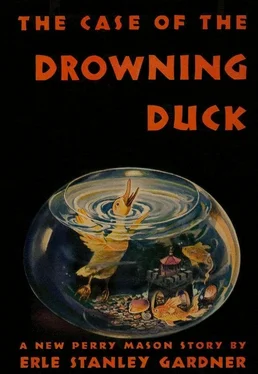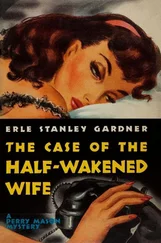She didn’t so much as bat an eyelash. Her face was a mask of cold disdain. “I don’t know to what you are referring,” she said.
Mason put sugar and cream in his coffee, stirred it, and drank the coffee slowly, enjoying his cigarette while he looked out at the scenery. The blonde who sat across from him continued to keep that cool stare of an annoyed young woman who is keeping herself very much aloof.
Mason finished his coffee, pushed back his chair, and got to his feet.
Surprise showed in the young woman’s eyes. “Is... is that all?” she asked, the words slipping in an unguarded moment through the wall of her reserve.
Mason smiled down at her. “You answered my question when I first asked it,” he said.
“How?”
“By that look of stiff surprise, by that dead pan, and the studied calmness of your reply. You’d been rehearsing your answer to it all night. You knew someone was going to ask it.”
With which he calmly strode from the diner, leaving a very disconcerted young woman craning her neck to stare at his back as he jerked open the door, crossed the vestibule, and went into the sleeper.
Mason found Marvin Adams in the last car. Adams stared up at him incredulously, got to his feet. “Mr. Mason!” he exclaimed. “I didn’t know you were taking this train.”
“I didn’t either,” Mason said. “Sit down, Marvin. I want to have a quick talk with you.”
Adams moved over so that Mason could sit down beside him.
Mason crossed his knees, made himself as comfortable as possible, leaning an elbow on the cushioned arm of the Pullman seat. “You took a duck from Witherspoon’s place last night,” he said.
Marvin’s face broke into a grin. “Cutest little cuss you ever saw. I got to feeding him flies, and he was just like a pet.”
“What happened to him?”
“Ί don’t know what did happen to him. He disappeared.”
“How?” Mason asked.
“I took him into town in the car I was driving.”
“Your car?”
“No, one that I’d borrowed from one of the boys there in El Templo. It was the sort of car a junior-college kid would drive. You know, it has seen a lot better days, but it gets you there and gets you back.”
“You drove it out to the Witherspoon ranch?”
Marvin Adams grinned. “Took the old junk heap out and parked it right in front of the family mansion,” he said. “I always thought it made Witherspoon sore when he saw that heap parked out in front of the place. Two and three times he told me whenever I wanted to come out, if I’d just telephone in, he’d have a chauffeur drive one of his cars in and pick me up.”
“You didn’t do that?”
“I’ll say I didn’t. The old heap didn’t look like much, but it was my sort. You know the feeling.”
Mason nodded. “Lois didn’t mind?” he asked.
The gleeful grin on the young man’s face faded into a tender smile. He said quietly, “She loved it.”
“All right,” Mason said, “you took the duck into town in that car, and what happened?”
“I’d said good-by to Lois. I had a quick job of packing a suitcase on my hands, and then a train to catch — and I suddenly realized I was hungry. I wanted a hamburger. There wasn’t any parking place on the main street. I knew a nice little restaurant down on Cinder Butte Avenue. I took the car down there and parked it...”
“Directly in front of the restaurant?” Mason interrupted.
“No. The place was pretty well cluttered up with cars. I had to drive about a block before I found a parking place. Why?”
“Nothing,” Mason said. “Just getting the picture straight is all. Guess that’s the lawyer in me. Go on.”
“Why all the commotion about the duck? Is old man Witherspoon sore at losing one of his prize ducks?”
Mason avoided that question, countered with another. He said, “That time when I first met you, you were mentioning something about sinking ducks with some new type of chemical. What’s it all about?”
“They’re known as detergents,” Adams said.
“What’s a detergent?”
The young man’s face showed the enthusiasm a person feels when he’s discussing a favorite subject. “The molecules of a detergent are built up on a complex structure. One end of each of the long molecules is hydrophobic, or, in other words, it tends to be repelled by water. The other end is hydrophilic, or has an affinity for water. When a detergent is mixed with water and applied to an oily surface, the end of the molecule which doesn’t affiliate with the water adheres to the oil. The other end affiliates with the water. Everyone knows there’s a certain natural antipathy between oil and water. They don’t mix. But a detergent does more than mix them. It really marries them.”
“You mentioned something about a sinking duck,” Mason said.
“Yes, you can accomplish things with a detergent that seem physically impossible. Quite frequently, nature uses the repellent properties of oil and water to give animals or plants a certain protection. Take the duck, for instance. The duck’s feathers ordinarily repel water, and therefore enclose within a good-sized volume a mass of air. If a small amount of this detergent or wetting agent is put on the water, the detergent immediately wets the oily feathers. Then, by capillary attraction, the water soaks into the feathers in the same way it would soak up into a sponge. If you’re interested, I can send you some material on it.”
“No, thanks. That won’t be necessary. I just wanted to find out something about it. I suppose you intended to use this duck in connection with a similar experiment.”
“Yes, I did. Gee, he was a cute little cuss. I thought I’d keep him as a pet. The experiment doesn’t hurt him any. You can have a lot of fun with it; particularly when some guy doesn’t like you and wants to call you on every slip you make, you can throw out a remark about a drowning duck and...”
“The way you did with Burr?” Mason asked.
Adams grinned, nodded his head, then after a moment added, “I was showing off in front of Lois. But Burr had it coming. He’s always had a chip on his shoulder as far as I was concerned.”
“Any reason?” Mason asked.
“None that I can see. Of course, Mr. Mason, I’m going to be frank with you. Witherspoon doesn’t like the idea of my marrying into the family. I know that — but that’s not going to stop me. I’m going to do what will make Lois happy. And I have a right to consider my own happiness. In the next few months, I’m going into the Army. I don’t know what’s going to happen after that. No one does. I know it’s going to be a tough job. I... gee, I’m talking too much.”
“No, you aren’t,” Mason said. “Go on. Let’s have the rest of it.”
“Well,” Adams said, “I feel that I’m going to be risking my life, and a lot of fellows just like me are going to be risking their lives, so that birds like Witherspoon can enjoy the things they have. I suppose I shouldn’t feel that way, but — well, anyway, I feel that if I’m good enough to go out and fight for John L. Witherspoon, I’m good enough to marry’ into his family. I know it doesn’t make sense in a way, but — oh, hang it, I love Lois and she loves me, and why should we get silly and store up a lot of tragedy for ourselves. We may have only a few weeks together.”
“Why wouldn’t you consent to go to Yuma and marry her last night?” Mason asked.
Adams let his face show surprise; then his eyes narrowed slightly. “Who told you about that?” he asked in a coldly formal voice.
“Lois.”
Adams remained silent for several seconds, then said, “Because it was a sneaky way to go about it. I wrote her a letter after I got on the train, and told her if she still felt the same way about it next week, to go ahead and tell her dad what we were going to do, and then we’d do it.”
Читать дальше












